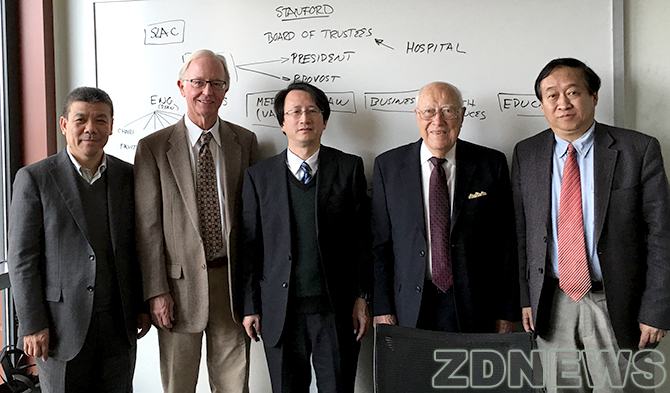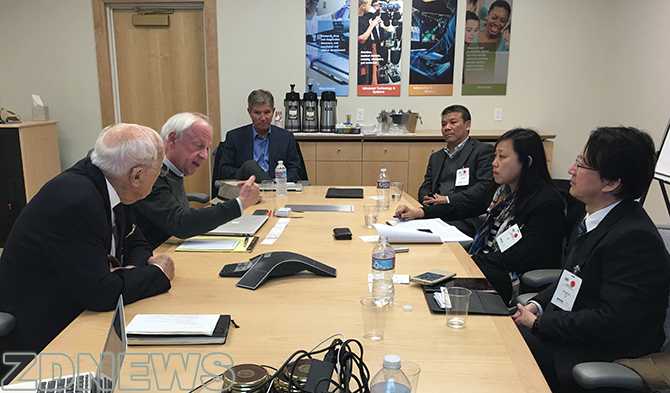Wu Zhaohui Visits Stanford University


At the invitation of Stanford University, the ZJU delegation led by President Wu Zhaohui paid a visit to the Interdisciplinary Biosciences Institute (Bio-X), SRI International and the Department of Computer Science on March 7.
On the morning of March 7, the delegation visited Stanford Bio-X and held a talk with Prof. Channing Robertson, the newly emeritus former chair of chemical engineering at Stanford. Stanford Bio-X was founded in 1998 and its mission is to catalyze discovery by crossing the boundaries between disciplines, to bring interdisciplinary solutions and to create new knowledge of biological systems, in benefit of human health. It supports, organizes, and facilitates interdisciplinary research connected to biology and medicine. Ideas and methods embodied in engineering, computer science, physics, chemistry, and other fields are being brought to bear upon important challenges in bioscience. In turn, bioscience creates new opportunities in other fields. Significant discoveries and creative inventions are accelerated through formation of new collaborative teams.
Prof. Channing Robertson made his outstanding contributions to the development of Bio-X. He spelled out the history, mission, and organization of this institute and a complete range of academic events to the delegation. “Zhejiang University is a comprehensive research university which promotes interdisciplinary studies and the development of emerging sciences. There are striking resemblances between ZJU and Stanford University in terms of research concepts,” said Wu Zhaohui, “We will learn the academic, research and operational pattern of Bio-X and propel talent cultivation and scientific research in different fields.” He hoped that ZJU and Stanford University will enhance mutual understandings and enter into multiple partnerships via summer programs.
The delegation also visited the Optogenetics Innovation Laboratory, the Stanford Center for Innovation in In-Vivo Imaging, and the Stanford Radiology 3D and Quantitative Imaging Lab at Clark Center. Subsequently, they visited the Department of Computer Science to discuss prospective approaches to cooperation. It is hoped that ZJU and Stanford University can promote cooperation in common fields.
On the afternoon, the delegation met with Stephen Ciesinski, President of SRI International and Claude Leglise, a Visiting Senior Executive at SRI International.
SRI International, founded in 1946, is a nonprofit, independent research center serving government and industry. It works on some of the world’s most important problems, collaborating across technical disciplines to spark new ideas and solutions. Its research and innovations have led to new industries and products that impact people’s lives every day—from the computer mouse and interactive computing to medical ultrasound, cancer drugs, and much more. Its sponsored research and development has amounted to 4 billion dollars in the last decade. It receives 540 million dollars in annual revenue, obtains roughly 4,000 issued patents, has 2,100 employees and sets up 60 spin-off companies.
Stephen Ciesinski introduced to Wu Zhaohui the history, mission and operation of SRI International. Wu looked forward to collaboration and communication between each other in various domains, including interdisciplinary research and development programs, new technology and products, and entrepreneurship training.





